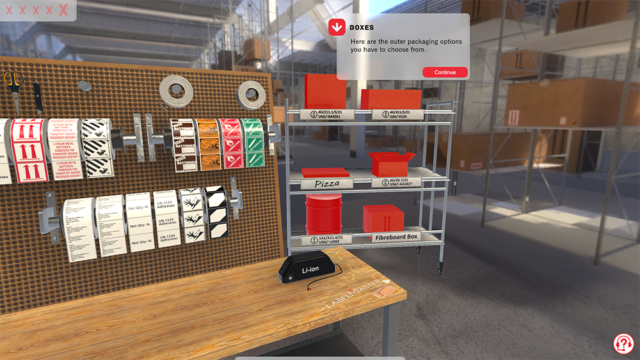
We all know that training is mandated by law for any workers involved in the transport of Dangerous Goods. But what about supply chain workers who aren’t involved in hazmat transport? Should they undergo training as well?
For many forward-thinking supply chain organizations, the answer is yes.
Now, you might well ask, “Why would we invest in training we’re not required to provide?” Or “Why train people to do things that aren’t part of their jobs?”
Those are fair questions, and we’ll offer a few answers down the page. But the main answer is that a workforce that’s better-educated about Dangerous Goods shipping gives operations a competitive edge.
That’s why many successful supply chain operations invest in online hazmat training for all their newer workers. Here are a few reasons you should, too.
Workers need to know what hazmat is
The first step in running a compliant Dangerous Goods operation is identifying what’s hazmat and what isn’t. Countless businesses—mostly smaller operations, but some large ones as well—run into trouble because they shipped something they didn’t even know was hazmat.
Even in the biggest, best-run supply chain companies, employees who don’t handle Dangerous Goods may still need to recognize that an item or material is classified as hazardous for transport. If they fail to do so—because they’ve had no hazmat training—the consequences could be a civil penalty, a delayed shipment, or even a costly incident.
Workers may grow into hazmat roles
You’ve probably heard this one:
Executive 1: What if we invest all this money into training our employees, and they leave?
Executive 2: What if we don’t, and they stay?
Smart organizations in every industry recognize the value of training employees not just for the roles they have now, but also for roles they may grow into.
In the supply chain, a warehouse picker may move to a different location that handles hazmat, a truck driver may be assigned a different route delivering hazmat, or anyone could be promoted to overseeing employees who handle hazmat. These employees can all be more productive right away in their new roles if they’ve already taken general awareness online hazmat training.
Customer service needs training to help with reverse logistics
Imagine someone who works in customer service, in a different part of the building—or a different part of the country—from where Dangerous Goods is handled. How can they possibly benefit from Dangerous Goods training?
Two words: reverse logistics.
End-users—think electronics customers or auto dealerships—often don’t know how to ship hazmat compliantly. In fact, they often don’t know they’re shipping hazmat at all. When they return what they’ve bought from you it can turn into a major hassle. And they’ll blame you!
That’s why it’s helpful for your customer service folks to have a basic level of Dangerous Goods training. They can help your customers make Dangerous Goods returns easy and hassle-free.
Executives need basic DG knowledge
People who work in higher management may never come within 10 meters of a Dangerous Goods package. But hazmat training may be as important for them as for anyone.
Why? Because their decisions have huge implications, and if those decisions are made without some basic knowledge about hazmat compliance, the consequences can be costly.
For example: We know of a manufacturer who planned to introduce a new item that required a large format lithium battery. They were well into the prototype stage before they learned that the packaging required to ship their item compliantly was going to cost several times more than they had budgeted. In fact, the extra cost cut so deeply into their projected margin that they abandoned the project.
With some basic hazmat training, they could have budgeted more accurately from the beginning and either salvaged the project or saved enormous time and labor by dropping it sooner.
Online hazmat training is perfect for newer supply chain workers
Do all these people need extensive, function-specific, in-person training? Of course not. But they can all benefit from an online general awareness training course, and many might find other, more specialized courses useful, too.
Online courses are ideal for non-DG workers because they’re so convenient and cost-effective. People can take them on their own time without being pulled away from their daily workflows and responsibilities, so there’s no loss of productivity.
Of course, you need to choose the right online courses. Labelmaster modules engage employees with animated graphics and frequent knowledge checks. They’re written by some of the world’s leading DG trainers. And have you seen our game-inspired, 3D interactive experience? It’s no wonder 94% of our customers call Labelmaster online training “fun and engaging.”
Better training is smarter business. See how Labelmaster online training can make your business smarter today.
Make sure your shipments are safe and in complete compliance with a full line of solutions from Labelmaster—a full-service provider of goods and services for hazardous materials and Dangerous Goods professionals, shippers, transport operators and EH&S providers.


